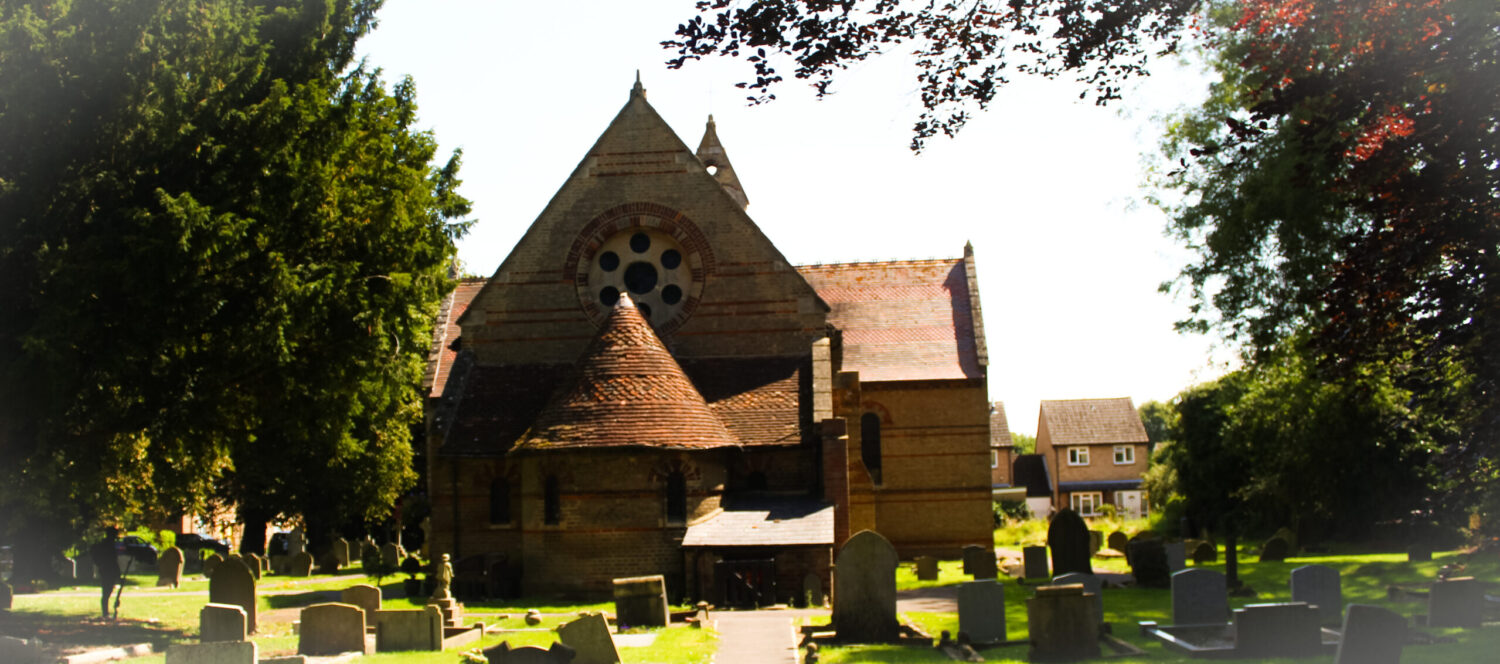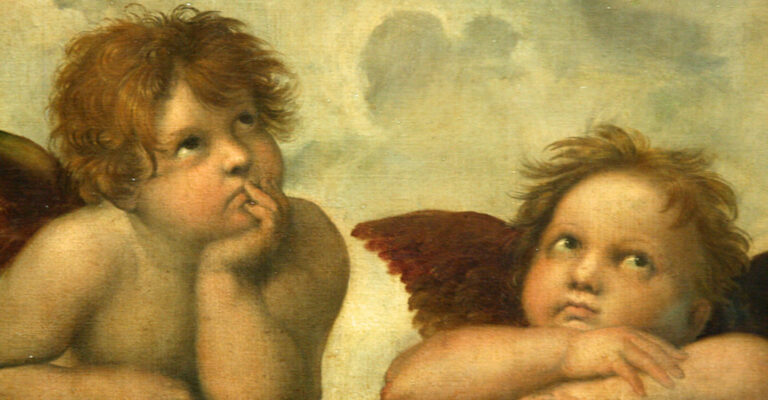Papa Malliaros writes...
5th October
I believe in Angels
I’ve been asked to publish my thoughts about angels from last week’s sermon, so here goes. The context here is that Sunday was the feast of St Michael and All Angels (Michaelmas), so our readings were of Jacob dreaming about angels going up and down a ladder, Revelation reporting Michael being involved in a war in heaven, and Jesus telling Nathaniel that he would see “angels ascending and descending upon the Son of Man.”
To start with, a quote from ABBA.
I believe in angels;
Something good in everything I see.
I believe in angels.
When I know the time is right for me,
I'll cross the stream; I have a dream.
Do you believe in Angels, as ABBA famously sang? Or is it just a dream?
Every so often, there’s a story in the news about how many people believe in angels. Some are slightly concerning: “More than twice as many Americans believe in angels as in Climate Change! A 2015 survey found that 59% of Britons believe in angels, and a third believe they have a personal guardian angel. Even among those without religious affiliation, many still believe in angels or spiritual forces.
But what does this really tell us? What it actually tells us is that public polling is rubbish. The way a question is framed is what influences the answer. If asked whether I believe in angels while being shown a Renaissance painting of cherubs, I would say no, despite being a priest. I believe in angels—just not the kind portrayed as chubby infants or whimsical beings from pop culture.
Angels often appear in popular culture, but not always realistically. Movies like City of Angels and Michael depict angels in romantic or quirky ways. Dogma features banished angels seeking a loophole to return to heaven, while The Preacher’s Wife and It’s A Wonderful Life show angels answering prayers to earn their wings. I ought to add that if you’re easily offended, you should avoid Dogma.
However, these portrayals are far from the reality described in scripture.
In the Bible, angels are agents of God’s will—messengers, warriors, and protectors. Revelation reminds us that God uses angels to watch over us, both directly and indirectly. While angels are depicted in art as humans with wings to show that time and space do not constrain them, swords to signify their power, and dazzling apparel to represent their ability to enlighten faithful humans, scripture portrays them as beings far beyond our comprehension, appearing when we least expect them, carrying out God’s will, and fighting against sin and evil on our behalf.
The word “angel” is from the Greek Angelos, which means “messengers.” They are messengers from God, sometimes visible, sometimes invisible, who may take human or non-human forms. In the Hebrew Scriptures, sometimes a character sees someone who speaks to them with authority, who they later realise was no mere human but a messenger of God. We may be aware of them, or we may not: the message will be delivered. If the message gets through, the messenger has been successful. If God's message gets through to you, there has a messenger, an angelos. An angel.
Of the many angels mentioned in the Bible, only four are called by name: the three Archangels, Michael, Uriel, and Raphael, and the Angel Gabriel. (Contrary to popular Western opinion, Gabriel is not an Archangel - Luke and the writer of Daniel are very clear on that point.)
In Jewish tradition, it’s Michael who intervened in the sacrifice of Isaac, wrestled with Jacob and saved the three young men from the fiery furnace in the Book of Daniel. In Christian tradition, Michael is regarded as a warrior—defeating Satan in the battle in heaven. Michael also appears in the Epistle of Jude. Michael is a fearsome warrior, very different from the cute Renaissance images.
Traditionally, Raphael (the name means “God heals”) is the one mentioned in the book of Tobit, where, disguised as a man, he accompanies the young Tobias on a mission, enables him to accomplish it, and provides medication to treat the blindness of his aged father.
Uriel (which means “God is my light”) is mentioned in 2 Esdras, and that is pretty much all our canonical scriptures tell us, though he and Raphael turn up sometimes in—how shall I put it—less reliable sources.
Gabriel is much more familiar to us because of his appearance in our Christmas nativity narratives. Gabriel (the name means “God is my champion”) is considered the special bearer of messages from God to men. He appears in Daniel 8 and 9 to explain some of Daniel’s visions. In the first chapter of Luke, he announced the forthcoming birth of John the Baptist to Zachariah and Jesus to the Virgin Mary.
The Bible tells us many stories of angels involved in the work and will of God. Abraham entertained angels; Angels gave Joshua instructions; Elisha commanded an army of them; angels set Ezra riddles. The writer of Daniel credited the fall of Babylon to their actions, and they appear to protect the eponymous hero in the lions’ den. Peter was sprung out of jail by an unnamed angel, and of course, angels were there at the resurrection.
Many faithful Christians struggle to believe in the reality of angels; to them, angels are as unbelievable as unicorns, gryphons, or phoenixes. The depictions of angels on the big screen and in saccharine nativity plays do not encourage us to take them seriously. But perhaps we should.
Undoubtedly, many of the scriptural references to angels are metaphorical or are simply the writers struggling to put into words something that defied rational description. But people continue to experience things that, while they might have a physical, scientific explanation, can be better described philosophically in terms of the actions of an agent of God.
To use one of my favourite quotes, Teresa of Avila famously said,
Christ has no body but yours,
No hands, no feet on earth but yours,
Yours are the eyes with which he looks compassion on this world,
Yours are the feet with which he walks to do good.”
We are the mechanism by which God blesses all the world.
God continues to be interested in this, his world, and he continues to intervene through the actions of agents: you and me, and maybe through other channels as well. God uses human agents and sometimes acts through natural agencies, too.
I believe in Angels.
I’ve experienced moments where God’s message came through clearly, whether through the kindness of another person or an inexplicable feeling of divine presence. Sometimes, we are prompted to act in ways that seem beyond our understanding, only later realising the importance of that act of kindness. In those moments, we may unknowingly serve as angels.
And so this is the real message for today. In the difficult times, there will be angels around you, messengers, agents from God, doing God’s will on your behalf, fighting for you. And don’t be surprised if many of those angels look like people you know. God still sends them to you to give you the message of hope that God is on your side.
So many times when we read scripture, we find that he sent his angels to minister to the needs of his servants, to deliver the right help or the right message at the right time. Should you ever need such divine assistance, be assured that an angel of some description will be there.
23rd August
There ought to be a sense that summer is coming to a close.
The football season has kicked off again, bringing with it a delightful three hours last Saturday when Liverpool were top of the Premier League. But there is still a significant amount of cricket to be played, so plenty to keep Papa M occupied when sermon writing becomes too much of a chore. It must be admitted, though, that Lancashire Cricket Club are not having the kind of season that the Reds had under the previous regime at Anfield, so we might just have to concentrate on the England Men's team, who are being rather un-English by having a remarkably good summer and winning everything.
Speaking of a good summer, a good time was had by all who attended the Barbecue in the churchyard last Sunday in glorious sunny weather.
There is a gallery of photos, which you can view here. If you have any more that you would like to add to the gallery, just send them to me via the email address that is on the weekly sheet.
Huge thanks are due to everyone who arranged the barbecue and worked to ensure everyone had a good time - you know who you are. With the takings from that event, topped by the Coffee Money, we are able to donate over £300 to each of the charities - so everyone, give yourselves a pat on the back.
The arduous process of settling into the new pied a terre continues, albeit not with any tremendous sense of urgency. Of much more concern is the garden, because we have to be absolutely certain that Dexter can't get out*. To that end, the shed will have to go. The problem is that when Dexter is behind it, I don't know what he is getting up to. Doubtless, those who have been parents of small children will sympathise, remembering that sense of unease when you can neither see nor hear the little darlings and don't know what mischief they are creating. So, the edifice that Dexter loves to hide behind is a source of anxiety and almost paranoia to me. If anyone knows how to dispose of a dilapidated, partly rotten, ivy-infested shed, we would be grateful to hear from you. Please send suggestions to the Vicarage.
Once I get properly settled, I'll post here more often than once a month.
But that's all for now.
Every blessing,
Papa Malliaros
* Dexter hasn't actually escaped for about six weeks. So maybe he can't get out anymore. Mind you, that's what we thought back then...
22nd July
I'll explain another time why this is written under the pseudonym Papa Malliaros, although perhaps I'll offer a prize (a condescending pat on the head) to any smart aleck who can guess why before the revelation. I could have called this blog The Rambling Rector, but sadly, modern plagiarism laws make this impossible - a colleague of mine from my Derby Diocese Days has already done this. (I understand that Rambling Rector is a reference to a rose - I'm no gardener, as anyone who has seen the Castle's back garden recently will testify). So Papa Maillaros, the Musing Minister it shall be.
As mentioned by my renowned, illustrious predecessor in his column, he and I had a meeting last week. Although I begged him with floods of tears, rending my garments and covering my bald patch with ashes, Frank was certain in his mind that he wanted to retire his "Home Thoughts From Abroad" Column. As a concession to my finer feeling, he will keep it going longer than he had intended to do. Some mention was made to a scriptural reference (John 3.30) where John the Baptist says of his successor, "He must increase, but I must decrease". Of course, it's possible that this was a reference to the fact that Frank looks fit and slim, two adjectives that have not described me for nearly two decades.
Nevertheless, the decision - well, his decision, really - was that Home Thoughts From Abroad will fade away by the autumn. When I am indisposed, there will be guest appearances on this blog, but other than that, I'm afraid you'll have to get used to my ramblings - blog posts filled with references to Football, and especially the Mighty Reds (Liverpool FC), Cricket (The Red Rose Rules), and Rugby (especially Y tîm pwerus Cymru).
Plus ça change, plus c'est la même chose, as I'm sure President Macron said before calling his pointless election recently.
Every blessing,
Papa Malliaros.


